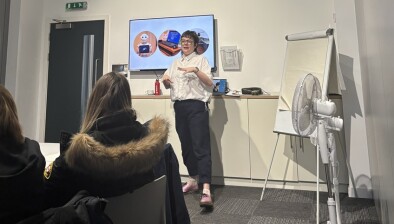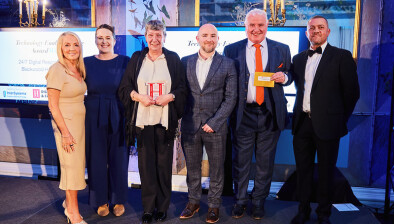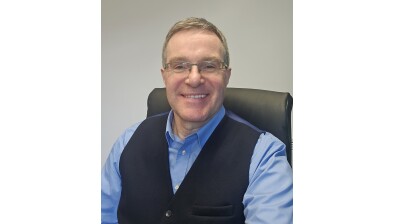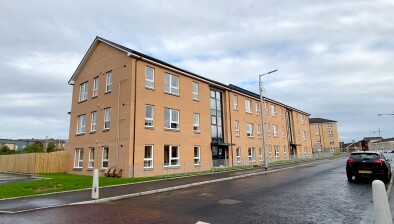New app used to gamify daily tasks for Scots in three Blackwood communities
Blackwood has drafted in game developers to give a fun and interactive twist to living and working in a trio of its communities.
(from left) Hyper Luminal creative director Rob Madden, CEO Stuart Martin and chairman Sean Tracey
The team at Hyper Luminal normally create entertainment games for Xbox, PlayStation and iPhone - but were challenged to gamify everyday life and encourage thousands of Scots to live in healthier ways.
Now the MyLife app, developed by the Dundee-based studio, is being rolled out as part of Blackwood’s Peoplehood project which aims to positively transform life for locals in three Scottish communities.
Peoplehood is a £12.5 million project to develop a future-proof model for independent living in communities in Glasgow, Dundee and Morayshire, helping people to live healthier, happier and longer. The three-year initiative will create a blueprint for welcoming communities with age-friendly homes, supported by cutting-edge technologies and safe outdoor spaces to sustain physical activities.
The funding will see each area benefit from free tablets and Wi-Fi for participants to help them get digitally connected, while also delivering e-bikes, electric cars and a host of equipment and activities within communities, all according to local demand.
Stuart Martin, CEO of Hyper Luminal Games, said the app was developed in a careful process involving local people who will use it, part of the co-design ethos at the heart of the Peoplehood initiative.
He added: “Blackwood residents are our beta testers because only by finding out what is important to them - identifying services and functionalities which should be prioritised and seeing them interact with the app - can we be sure that MyLife will improve their lives.”
The co-design process showed that many testers enjoyed digital games, puzzles and brainteasers, but did not consider that gaming.
Stuart added: “The common response was ‘we don’t play games’ but just because you don’t pick up a game pad or use a PlayStation doesn’t mean you are not a gamer.
“Once we probed further, we found many played Candy Crush or Sudoku on phones or did crosswords on a tablet, and they accepted that MyLife could be an interesting and valuable addition to daily life.”
He also praised Blackwood for its progressive attitude to tech. The charity pioneers innovation in the social housing sector and its bespoke ‘Blackwood Home’ model is a leader in tech-enabled independent living. Its “CleverCogs” digital system makes life easier for older people and people with disabilities.
Stuart added: “The way that Blackwood embraces technology, and especially games technology, has been revolutionary. MyLife is another example of how they are at the forefront of innovative technology which makes their residents’ lives happier, healthier and more fun.”
The app features an on-screen avatar character to keep residents informed of local events and motivate them to take part in community activities, with suggestions suited to their needs, interests and abilities.
Each avatar will also take into account the medical, health and mobility circumstances of individual users, who can earn real-life awards – such as free gardening work or use of an electric car or e-bike. The more they engage with MyLife, the greater the potential rewards.
Hyper Luminal junior QA tester Scott Burt (left) and QA tester Phoebe Anderson
Fanchea Kelly, chief executive of Blackwood, said: “MyLife will get to know a resident’s daily schedule and can suggest tasks or activities which encourage mobility. It could be as simple as washing some dishes, going for a walk or speaking to a neighbour, all of which earn rewards which can be used to customise their avatar.
“Blackwood credits can also be earned from community engagement or interaction, for example doing a neighbour’s shopping or taking part in a dance class. Those credits can be used in a variety of ways such as the free use of a community e-car or getting their garden done for free.
“The avatar will be a friendly personal assistant but it is also designed to be a gateway to making new friends and a portal to allow residents to connect with other individuals. MyLife will be mindful of a person’s individual health circumstances such as mobility and mental health, and it can be enhanced by input from a person’s care provider or family member.”
The app will also collate data which will guide Blackwood in shaping and improving future services for Peoplehood residents. It can also be used for issuing questionnaires and act as a notice board for relevant announcements.
The Peoplehood Project received £6m UK Research and Innovation funding as part of the Industrial Strategy Challenge Fund/Healthy Ageing Challenge - the only project in Scotland to win funding - which was match-funded by a further £6.5m from Blackwood and its nine industry partners.
Detailed research identified the three most suitable Peoplehood locations. Charleston in Dundee was chosen because it already has a high number of specialist Blackwood Homes. Cardonald in Glasgow is best suited to explore the development of an integrated community, while Buckie, situated between Banff and Elgin, presents challenges around its rural location, public transport and WIFI accessibility.
The nine partner organisations working with Blackwood on Peoplehood are: the University of Edinburgh; Canon Medical Research Europe; Carebuilder UK; CENSIS; Cisco International Ltd; Enterprise Rent-a-Car UK; Lewis & Hickey Architects; Mydex CIC and The DataLab.







